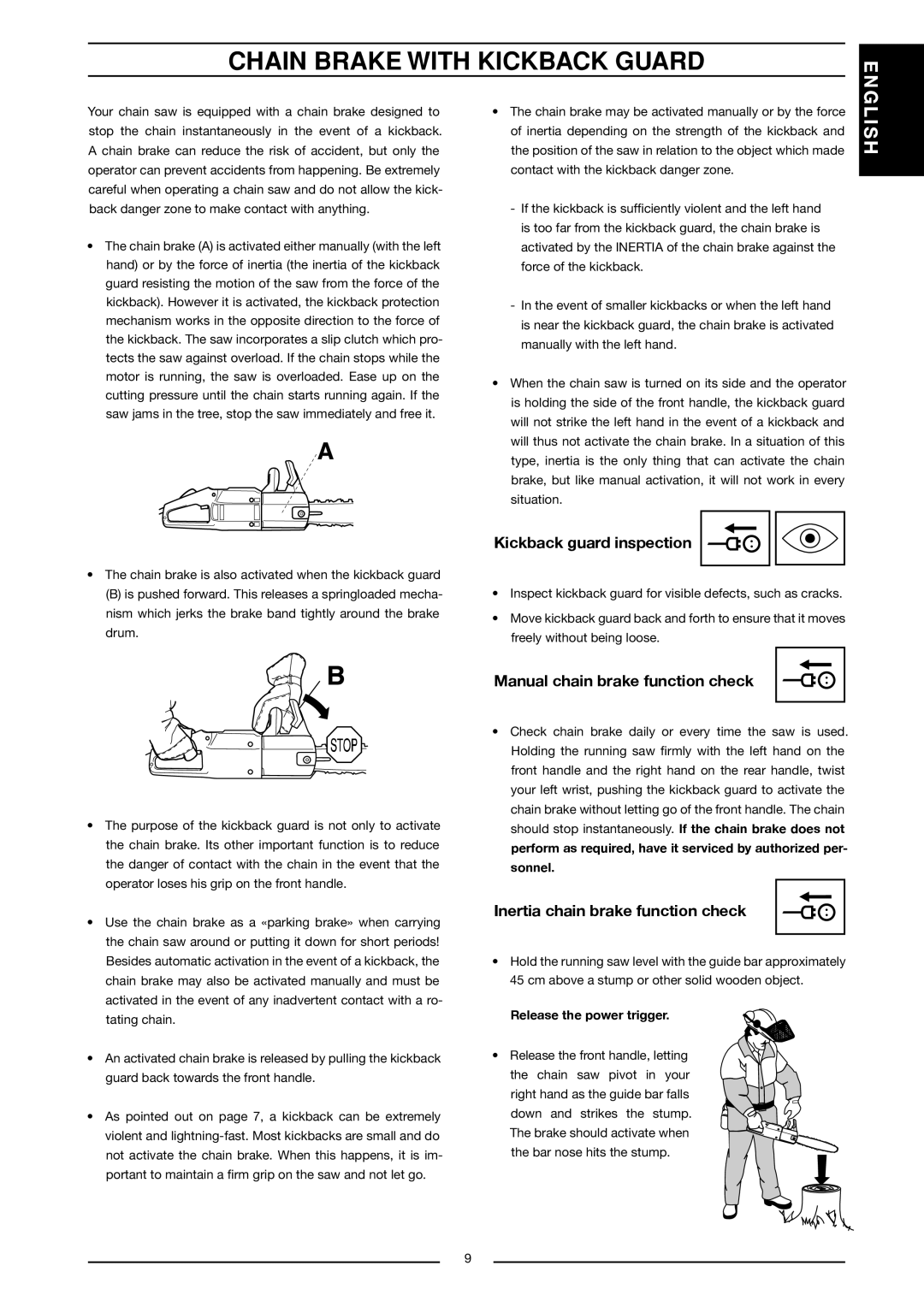
CHAIN BRAKE WITH KICKBACK GUARD
Your chain saw is equipped with a chain brake designed to stop the chain instantaneously in the event of a kickback. A chain brake can reduce the risk of accident, but only the operator can prevent accidents from happening. Be extremely careful when operating a chain saw and do not allow the kick- back danger zone to make contact with anything.
•The chain brake (A) is activated either manually (with the left hand) or by the force of inertia (the inertia of the kickback guard resisting the motion of the saw from the force of the kickback). However it is activated, the kickback protection mechanism works in the opposite direction to the force of the kickback. The saw incorporates a slip clutch which pro- tects the saw against overload. If the chain stops while the motor is running, the saw is overloaded. Ease up on the cutting pressure until the chain starts running again. If the saw jams in the tree, stop the saw immediately and free it.
•The chain brake is also activated when the kickback guard
(B)is pushed forward. This releases a springloaded mecha- nism which jerks the brake band tightly around the brake drum.
•The chain brake may be activated manually or by the force of inertia depending on the strength of the kickback and the position of the saw in relation to the object which made contact with the kickback danger zone.
-If the kickback is sufficiently violent and the left hand is too far from the kickback guard, the chain brake is activated by the INERTIA of the chain brake against the force of the kickback.
-In the event of smaller kickbacks or when the left hand is near the kickback guard, the chain brake is activated manually with the left hand.
•When the chain saw is turned on its side and the operator is holding the side of the front handle, the kickback guard will not strike the left hand in the event of a kickback and will thus not activate the chain brake. In a situation of this type, inertia is the only thing that can activate the chain brake, but like manual activation, it will not work in every situation.
Kickback guard inspection
•Inspect kickback guard for visible defects, such as cracks.
•Move kickback guard back and forth to ensure that it moves freely without being loose.
ENGLISH
•The purpose of the kickback guard is not only to activate the chain brake. Its other important function is to reduce the danger of contact with the chain in the event that the operator loses his grip on the front handle.
•Use the chain brake as a «parking brake» when carrying the chain saw around or putting it down for short periods! Besides automatic activation in the event of a kickback, the chain brake may also be activated manually and must be activated in the event of any inadvertent contact with a ro- tating chain.
•An activated chain brake is released by pulling the kickback guard back towards the front handle.
•As pointed out on page 7, a kickback can be extremely violent and
Manual chain brake function check
•Check chain brake daily or every time the saw is used. Holding the running saw firmly with the left hand on the front handle and the right hand on the rear handle, twist your left wrist, pushing the kickback guard to activate the chain brake without letting go of the front handle. The chain should stop instantaneously. If the chain brake does not perform as required, have it serviced by authorized per- sonnel.
Inertia chain brake function check
•Hold the running saw level with the guide bar approximately 45 cm above a stump or other solid wooden object.
Release the power trigger.
•Release the front handle, letting the chain saw pivot in your right hand as the guide bar falls down and strikes the stump.
The brake should activate when the bar nose hits the stump.
9
